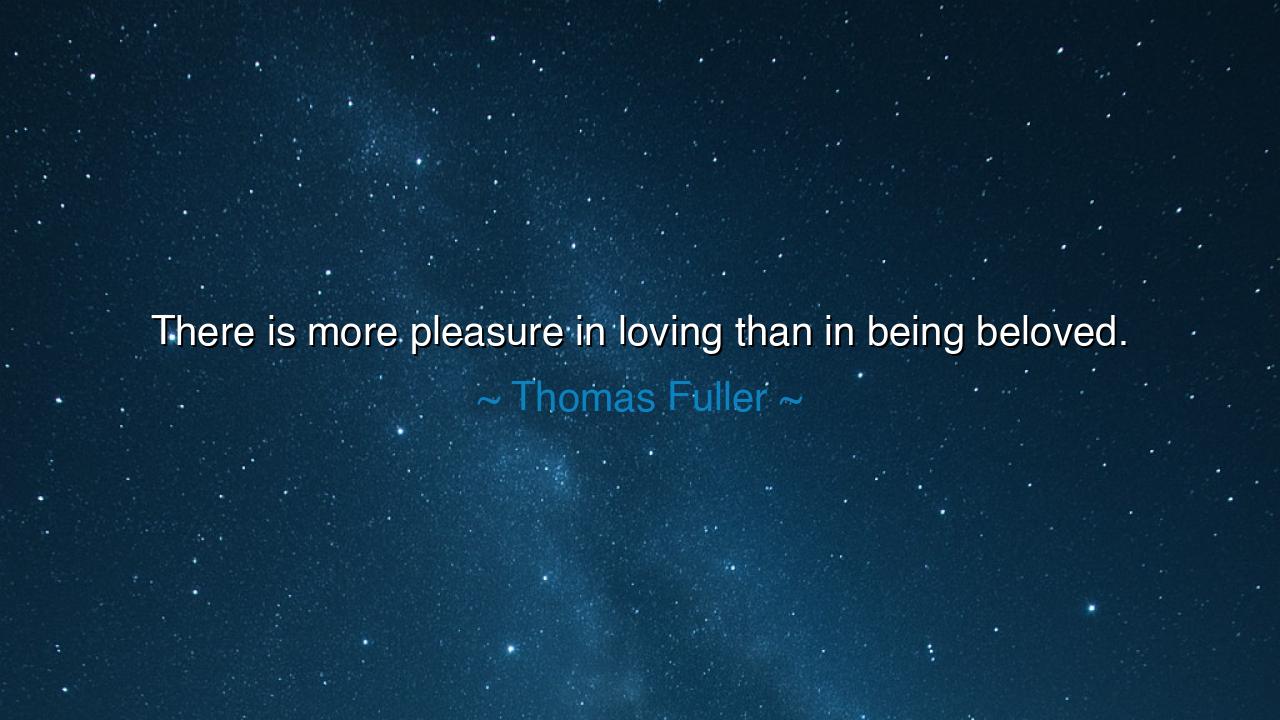
There is more pleasure in loving than in being beloved.






“There is more pleasure in loving than in being beloved.” — Thomas Fuller
In these luminous words, Thomas Fuller, the English scholar and divine, reveals one of the quiet secrets of the human heart — that the act of loving is richer, deeper, and more enduring than the sweetness of merely being loved. To love is to give life; to be loved is to receive it. Yet the soul, noble in its essence, finds its truest joy not in what it gathers but in what it gives. For love is not a possession to be held, but a flame to be kindled and shared.
In the ancient world, the wise understood that the pleasure of loving is the pleasure of creation itself. When one loves, one partakes in the work of the divine — to bring forth warmth from coldness, beauty from indifference, and light from darkness. The lover becomes a fountain that never runs dry, for every drop poured out of the heart returns as peace to the spirit. But to depend only on being beloved is to stand waiting at another’s gate, longing for alms that may or may not come. The one who loves, however, commands the treasure of their own soul — they are sovereign of their joy.
Consider the tale of Florence Nightingale, the Lady with the Lamp. Amidst the blood and chaos of war, she found her calling not in being adored by men or praised by the world, but in the act of compassion itself. She loved humanity — and through that love, she found an unshakeable purpose. The soldiers she cared for did not all remember her name, nor could they repay her. Yet the quiet ecstasy she felt in serving them, the sacred fulfillment of love freely given, became her immortality. She discovered, as Fuller wrote, that there is more pleasure in loving than in being beloved.
To love is to awaken the godlike nature within us. The one who loves truly does not count cost or seek reward. Their joy lies in the very act — in seeing another rise, in easing another’s pain, in bringing laughter to weary hearts. Such love does not wither when unreturned, for its roots grow in the soil of virtue, not vanity. The pleasure of loving is pure because it flows outward; the desire to be loved is fragile because it depends upon return.
Yet let it not be said that to love is to suffer. No — to love is to live greatly. Even when the heart is unreciprocated, the lover has tasted a grandeur unknown to the indifferent. Think of the poets and heroes who poured their hearts into love — Dante, who beheld Beatrice only from afar, yet built an immortal vision from her memory. His love, though never returned, lifted him toward the eternal, and through him, lifted mankind. The beloved fades; the act of loving endures beyond death.
From this truth emerges a sacred lesson: seek not first to be loved, but to love. Let your heart overflow with kindness, with understanding, with courage. Love your friends not for what they give you, but for what you can give them. Love the world, even when it seems unworthy, for in that act you cleanse and ennoble your own soul. Love is the only wealth that multiplies when spent.
And so, my children of time, remember this teaching: to love is to hold the power of creation within your chest. The joy of being beloved may fade with seasons and circumstance, but the joy of loving is eternal, self-renewing, divine. Be the giver, not the seeker; the flame, not the moth. Then you shall taste the truth of Fuller’s words — that there is indeed more pleasure in loving than in being beloved, for to love is to stand beside the gods themselves, shaping the world through the tenderness of your heart.






AAdministratorAdministrator
Welcome, honored guests. Please leave a comment, we will respond soon